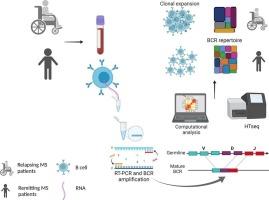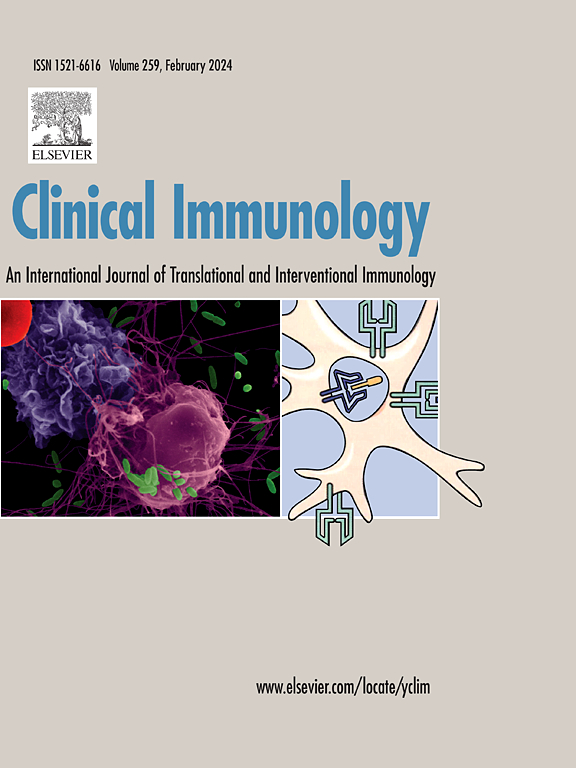多发性硬化症患者复发和缓解期间 B 细胞受体复合物的比较分析。
IF 4.5
3区 医学
Q2 IMMUNOLOGY
引用次数: 0
摘要
多发性硬化症(MS)是中枢神经系统(CNS)的一种慢性、多因素、炎症性和脱髓鞘疾病,涉及针对髓鞘成分的自身免疫反应。事实证明,抗 B 细胞疗法可成功减少复发。因此,研究疾病两个阶段(复发和缓解)的 B 细胞具有重要意义。在这里,我们利用新一代测序技术分析了复发期和缓解期的 11 名多发性硬化症患者、6 名其他炎症性神经疾病(OIND)患者和 10 名健康受试者(HCs)的外周血细胞 BCR 重排。此外,还采用酶联免疫吸附法对患者和对照组血清中的免疫球蛋白 G、M、A 和 D 进行了定量检测。与其他研究组相比,复发性多发性硬化症患者的 BCR 基因库显示出较低的多样性和较高的体细胞高突变率。在该组中,共享克隆型的比例最高。IGHV4-32基因被确定为MS和OIND之间的潜在差异生物标志物,IGL3-21基因也被确定为MS的潜在生物标志物。另一方面,缓解期 MS 患者血清中 IgG 和 IgD 升高,复发期 MS 患者血清 IgG 也升高。总之,这些结果显示了 B 细胞在多发性硬化症复发的发病机制中的重要作用,并为分析外周血 BCR 重排以获得多发性硬化症诊断工具提供了新的全景图。此外,这项工作还强调了在不同人群中进行研究的必要性,因为由于遗传背景和环境暴露的差异,在高加索人群中报告的结果可能与其他纬度多发性硬化症患者的免疫过程不一致。本文章由计算机程序翻译,如有差异,请以英文原文为准。

Comparative analysis of the B cell receptor repertoire during relapse and remission in patients with multiple sclerosis
Multiple sclerosis (MS) is a chronic, multifactorial, inflammatory and demyelinating disease of the central nervous system (CNS), which involves an autoimmune response against components of the myelin sheaths. Anti-B cell therapies have been proven to be successful in reducing relapses. Therefore, the study of B cells in both phases of the disease (relapse and remission) is of great importance. Here, we analyzed peripheral blood-cell BCR repertoire from 11 MS patients during a relapse phase and during remission, 6 patients with other inflammatory neurological diseases (OIND) and 10 healthy subjects (HCs), using next generation sequencing. In addition, immunoglobulins G, M, A and D were quantified in the serum of patients and controls, using ELISA. BCR repertoire of relapsing MS patients showed lower diversity, as well as a higher rate of somatic hypermutation compared to the other study groups. Within this group, the highest percentage of shared clonotypes was observed. IGHV4–32 gene was identified as a potential differential biomarker between MS and OIND, as well as IGL3–21 gene as a potential MS biomarker. On the other hand, an elevation of IgG and IgD was found in the serum of MS patients during remission, and the serum IgG was also elevated in MS patients during relapse. In conclusion, these results show the important role of B cells in the pathogenesis of the MS relapses and a new panorama on the analysis of the peripheral blood BCR repertoire to obtain diagnostic tools for MS. Furthermore, this work highlights the need of studies in diverse populations, since results reported in Caucasian populations may not coincide with the immunological course of MS patients in other latitudes, due to differences in genetic background and environmental exposures.
求助全文
通过发布文献求助,成功后即可免费获取论文全文。
去求助
来源期刊

Clinical immunology
医学-免疫学
CiteScore
12.30
自引率
1.20%
发文量
212
审稿时长
34 days
期刊介绍:
Clinical Immunology publishes original research delving into the molecular and cellular foundations of immunological diseases. Additionally, the journal includes reviews covering timely subjects in basic immunology, along with case reports and letters to the editor.
 求助内容:
求助内容: 应助结果提醒方式:
应助结果提醒方式:


